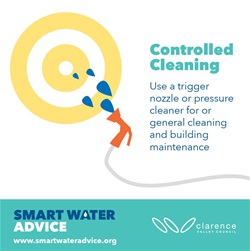With so much recent rain, it is easy to think we have too much water. But heavy rains often do not help our drinking water supply at all. High rainfall can cause muddy run-off and when this occurs our supply of clean water is threatened.
Another reason to save water during rainy times, is to “drought proof” our water use behaviours. What we practice now will be a habit when it really matters! In the Clarence Valley we know all too well that big swings in our climate are possible year to year. Water use habits greatly impact our ecological footprint and it is important to remember that we are sharing water with all the plants and wildlife in the local environment.
Water conservation isn’t just a fad for dry times, it’s a mindset, a way of life that reflects the immeasurable value of our limited clean fresh water.
Clarence Valley Council and Coffs Harbour City Council (as partners in our Regional Water Supply Scheme) have a set of water saving guidelines to encourage everyone to conserve water, all the time. These are just a few outdoor water saving rules, among countless ways to save water.
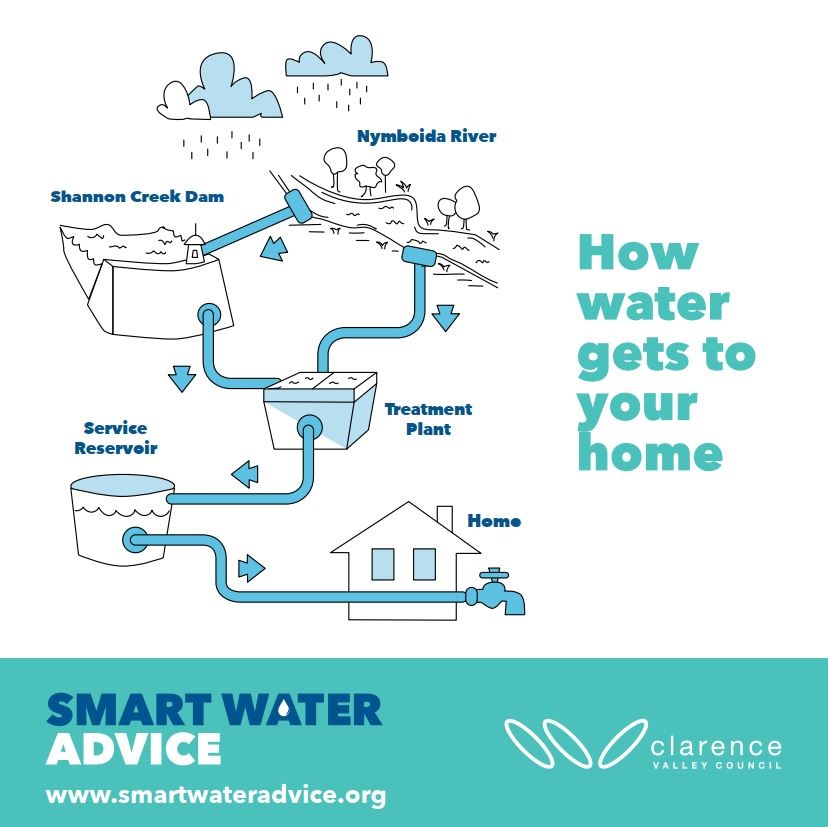
As part of National Water Week (17-23 Oct) we are shining the spotlight on water use in the Clarence Valley and the permanent conservation measures in place.
The beautiful Nymboida River is the Clarence Valley’s primary drinking water source. Water is extracted from the river when it meets strict quality standards and flows by gravity after first passing through our main treatment plant. Water is tested and retreated at reservoirs servicing different communities to ensure water quality is maintained for the people of the lower catchment.
Not all of our communities are served by this network. For example, Minnie Water and Wooli’s drinking water is supplied by nearby freshwater lakes; Lake Minnie Water, and Lake Hiawatha.
The “permanent water conservation measures” are as follows:
Dawn or Dusk – The use of sprinklers and unattended hoses is banned permanently from 9am-4pm.
Watering plants during the warmest times of the day results in much higher levels of evaporation and water loss. Morning and evening are also quite pleasant times for garden watering when the sun is low. To further ensure the water you give your garden is not wasted, mulch goes a long way to preserving soil moisture. Consider watering methods that give you full control over water application, like using trigger nozzle on a hose, or a watering can.
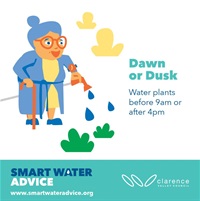
Wash Wisely – Car washing is allowed providing, where practical, the runoff water falls onto a lawn and is not directed to a stormwater drain.
Washing cars (or any mobile object) on your lawn ensures the dirty water also provides your grass with an extra drink. This water can contain dirt, oil, exhaust fume residue and soap chemicals which can be harmful to aquatic ecosystems. Instead of this water ending up in local waterways, washing on the lawn allows the water to be absorbed and filtered. Using a bucket is best, or otherwise use a trigger nozzle on a hose, or a pressure cleaner.
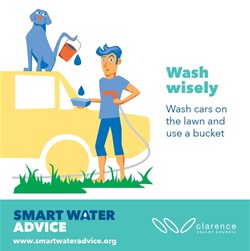
Broom or Blower – Hosing any hardstand area (e.g. driveways and paved/concrete surfaces) is banned, except for health/safety reasons or if you use a pressure cleaner.
Sweeping or using a blower is another way to save unnecessary water use. Where there is no other option, using a pressure cleaner is a good compromise as they have relatively low-flow, and flow stops immediately when you don’t need it.
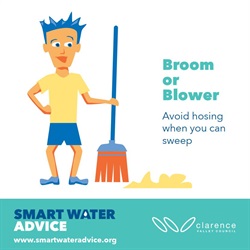
Controlled Cleaning – Building maintenance is allowed with trigger nozzle hoses or pressure cleaners only.
Where the only practical option is to clean with water, use a device that allows you to control the flow, and shuts flow off automatically. This includes trigger nozzles for hoses, or pressure cleaners are even better, with lower water volume, but higher pressure! But remember to still turn off at the tap when you have finished.
